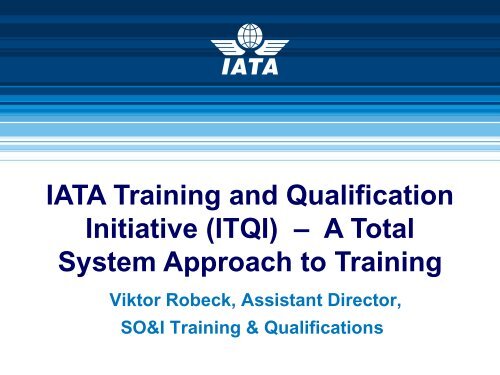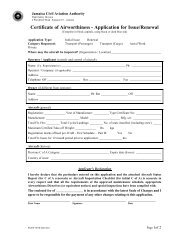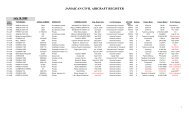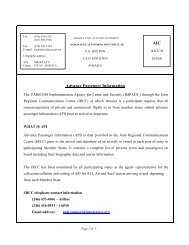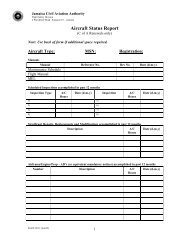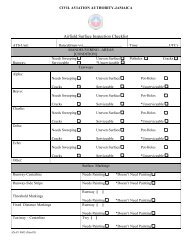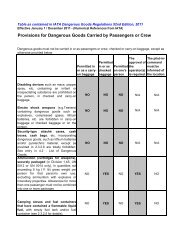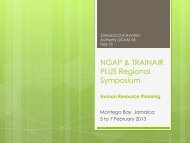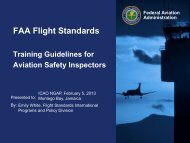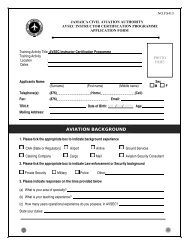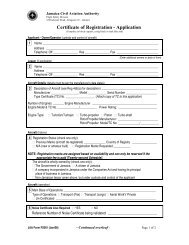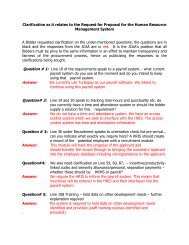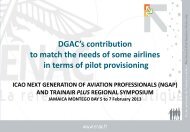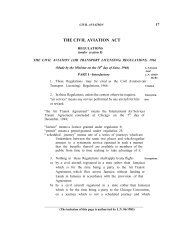Capt. Viktor Robeck (IATA)
Capt. Viktor Robeck (IATA)
Capt. Viktor Robeck (IATA)
You also want an ePaper? Increase the reach of your titles
YUMPU automatically turns print PDFs into web optimized ePapers that Google loves.
<strong>IATA</strong> Training and Qualification<br />
Initiative (ITQI) – A Total<br />
System Approach to Training<br />
<strong>Viktor</strong> <strong>Robeck</strong>, Assistant Director,<br />
SO&I Training & Qualifications
Representing 240 airlines<br />
comprising 84% of total air<br />
traffic<br />
NGAP/TrainAir Plus - Montego Bay<br />
2
Its mission, to represent, lead and<br />
serve the airline industry<br />
Represents airlines’ interests to<br />
governments & international<br />
organizations<br />
3
ITQI - Objectives<br />
ITQI was launched in 2007 with the objectives to:<br />
1. Modernize pilot and maintenance mechanics training<br />
2. Regulatory harmonization and market permeability to<br />
meet the future needs of the aviation industry and allow<br />
for a flexible, qualified workforce<br />
3. Identify means to improve industry attractiveness to<br />
younger generations<br />
NGAP/TrainAir Plus - Montego Bay 4<br />
5-7 Feb 2013
ITQI - Total System Approach<br />
From the selection criteria to training and assessment:<br />
<br />
Selection Criteria (Pilot Aptitude Testing)<br />
<br />
<br />
<br />
<br />
Multi-Crew Pilot License (MPL)<br />
Evidence-Based Training (EBT)<br />
Instructor Qualification (IQ)<br />
Flight Simulation Training Devices (FSTD)<br />
<br />
Engineering & Maintenance (competency-based training and<br />
qualification requirements)<br />
NGAP/TrainAir Plus - Montego Bay 5<br />
5-7 Feb 2013
<strong>IATA</strong> Training and Qualification<br />
Initiatives<br />
Achievements
Engineering & Maintenance<br />
<br />
Chapter 4 – Competency-based training and assessment for<br />
aircraft maintenance personnel – published in ICAO PANS-TRG<br />
Doc 9868<br />
Applicability date - 25 August 2011<br />
<br />
<strong>IATA</strong> “Guidance Material and Best Practices for the<br />
Implementation of Competency-Based Training in<br />
Maintenance” published in November 2011<br />
<br />
A CBT program assures harmonized task performance standards,<br />
upholding and potentially improving safety standards in aircraft<br />
maintenance. It simplifies employment of personnel from other<br />
regions.<br />
NGAP/TrainAir Plus - Montego Bay 7<br />
5-7 Feb 2013
Pilot Aptitude Testing (PAT)<br />
<br />
To support aviation managers understand, construct<br />
and implement a structured pilot selection process<br />
<br />
<strong>IATA</strong> Guidance Material and Best Practices for<br />
Pilot Aptitude Testing (PAT Manual), first<br />
published in 2010<br />
<br />
2 nd Edition of the PAT manual – available for free<br />
download www.iata.org/itqi<br />
NGAP/TrainAir Plus - Montego Bay 8<br />
5-7 Feb 2013
MPL - Multi-Crew Pilot License<br />
Transition from task-based training to competency-based<br />
training<br />
Focus on commercial airline specific training needs<br />
Maximise skill development which is relevant to airline<br />
operations<br />
Develop Crew Resource Management (CRM) and<br />
Threat and Error Management (TEM) skills<br />
NGAP/TrainAir Plus - Montego Bay 9<br />
5-7 Feb 2013
8 Core Competencies for Flight Crew<br />
<br />
ICAO, <strong>IATA</strong> and IFALPA agreed on a set of 8 core competencies for<br />
flight crew<br />
<br />
covering all phases of a pilot’s career, encompassing selection, ab-initio<br />
training, assessment for skills test, recurrency training and evaluation<br />
<br />
<br />
<br />
<br />
<br />
<br />
<br />
<br />
Communication<br />
Aircraft Flight Path Management - Manual Control<br />
Aircraft Flight Path Management – Automation<br />
Leadership and Teamwork<br />
Problem Solving and Decision Making<br />
Application of Procedures<br />
Work Load Managment<br />
Situational Awareness<br />
NGAP/TrainAir Plus - Montego Bay 10<br />
5-7 Feb 2013
Applying the 8 Core Competencies<br />
“The Total Systems Approach”<br />
The selection process of future airline pilots<br />
The continuous assessment during MPL<br />
The performance assessment in Evidence Based<br />
Training and Checking (EBT)<br />
The selection and qualification of instructors and<br />
examiners<br />
NGAP/TrainAir Plus - Montego Bay 11<br />
5-7 Feb 2013
Typical MPL Course Outline<br />
Training<br />
(clean)<br />
Phases Airplane / FSTD Training Hours Duration<br />
Ground School<br />
Core Flying Phase C172S/Type 1<br />
FSTD*<br />
26 weeks<br />
70+16+30 14 + 4 weeks<br />
Basic Phase Type 4 FSTD* 120 8 + 4 weeks<br />
Intermediate Phase Type 7 FSTD* 32 4 + 4 weeks<br />
Advance Phase Type 7 FSTD* 44 4 + 4 weeks<br />
NGAP/TrainAir Plus - Montego Bay 12<br />
5-7 Feb 2013
The leaders<br />
Lufthansa<br />
Air Berlin<br />
Swiss<br />
City Airline/Skyways (Sweden)<br />
Sterling<br />
Flybe (UK)<br />
China Eastern Airlines/Xiamen Airlines<br />
Air Asia (Malaysia)<br />
Tiger Airways (Singapore)<br />
NGAP/TrainAir Plus - Montego Bay 13<br />
5-7 Feb 2013
MPL - Implementation<br />
<br />
To support MPL implementation<br />
<br />
<strong>IATA</strong> developed Guidance<br />
Material and Best Practices for<br />
MPL Implementation, 1 st edition<br />
published October 2011<br />
<br />
Available for free download on our<br />
website: www.iata.org/itqi<br />
NGAP/TrainAir Plus - Montego Bay 14<br />
5-7 Feb 2013
MPL Summary<br />
Multi-crew environment from the start of training<br />
Development of Core Competencies rather than task<br />
drills<br />
Application of the TEM principle<br />
Continuous assessment against a pre-defined norm<br />
Objective data to drive ongoing student and course<br />
improvement<br />
Instructors are key and need a special preparation<br />
NGAP/TrainAir Plus - Montego Bay 15<br />
5-7 Feb 2013
Evidence-Based Training (EBT)<br />
What: identify, develop and evaluate the core<br />
competencies to operate safely, effectively and efficiently<br />
in a commercial air transport environment.<br />
How: address the most relevant threats according to<br />
evidence collected in accidents, incidents, flight<br />
operations and training.<br />
Why: prepare the pilot for the unforeseen event<br />
NGAP/TrainAir Plus - Montego Bay 16<br />
5-7 Feb 2013
Why Evidence-Based Training?<br />
By regulation, flight crew training and checking is based on<br />
events that are impropable in modern aircraft<br />
Current training programs are saturated with items that may<br />
not mitigate real risks or enhance safety in modern air<br />
transport operations<br />
Progress in the design and reliability of modern aircraft, a<br />
rapidly changing operational environment and the realization<br />
that not enough has been done to address the human factors<br />
issue, has prompted a strategic industry review of pilot<br />
training<br />
NGAP/TrainAir Plus - Montego Bay 17<br />
5-7 Feb 2013
NGAP/TrainAir Plus - Montego Bay 18<br />
5-7 Feb 2013
Benefits of EBT<br />
EBT aligns the training content with the actual<br />
competencies necessary to handle threats<br />
Based on actual incidents, accidents and safety data<br />
Focus on improvement of the 8 core competencies<br />
EBT modules consist of an evaluation phase, maneuvers<br />
training and a scenario-based training phase. Scenarios<br />
are the means to evaluate and develop competencies.<br />
NGAP/TrainAir Plus - Montego Bay 19<br />
5-7 Feb 2013
Objective<br />
Conduct<br />
Typical Recurrent EBT Module<br />
1<br />
2<br />
3<br />
Evaluation Phase<br />
Manouvres Training<br />
Phase<br />
Scenario Based<br />
Training Phase<br />
• Assess competence<br />
• Identify training needs<br />
• Validate training<br />
system performance<br />
• Train maneuver skills to<br />
proficiency<br />
• Validate system<br />
performance and skill<br />
decay<br />
• Manage the critical<br />
threats according to<br />
evidence<br />
• Improve competency to<br />
manage<br />
foreseen/unforeseen<br />
threats<br />
• Line orientated<br />
One or more<br />
occurrence<br />
• Assessment of one or<br />
more KSA Competency<br />
Elements<br />
• Sequence of deliberate<br />
actions to achieve a<br />
prescribed flight path<br />
• E.g. RTO, EF V1, OEI<br />
APP, OEI GA, Emer<br />
Descent<br />
• Line orientated flight<br />
scenarios<br />
• One or more<br />
predictable or<br />
unpredictable threats<br />
NGAP/TrainAir Plus - Montego Bay 20<br />
5-7 Feb 2013
EBT - The Source of the Data<br />
The sources used to identify the evidence in flight operations<br />
and training included LOSA reports, pilot surveys, training<br />
data from AQP and about 3000 incident/accident reports for<br />
four generations of jet airplanes covering the time period<br />
between 1962 and 2010.<br />
The analysis was done by 30 people and took over three<br />
years.<br />
The top five conclusions from the EBT data analysis fall into<br />
the categories: manual flight, surprises, catalysts, prioritization<br />
of training topics and the unstable approach paradox. These<br />
supported the definition of the eight core competencies.<br />
NGAP/TrainAir Plus - Montego Bay 21<br />
5-7 Feb 2013
Proof of Concept Phase<br />
Adoption of EBT principles<br />
Phase 1 (Recurrent)<br />
<br />
<br />
<br />
<br />
<br />
<br />
<br />
Emirates (Feb 2011) – GCAA<br />
Dragonair (April 2011) – HK CAD<br />
Cathay Pacific (Dec 2011) - HK CAD<br />
Air France (2012) – DGAC<br />
Qantas (Mar 2012) – CASA<br />
Qatar Airways – QCAA<br />
Air Transat – Transport Canada<br />
Phase 2 (Type Rating)<br />
<br />
British Airways – UK CAA<br />
NGAP/TrainAir Plus - Montego Bay 22<br />
5-7 Feb 2013
Amendment proposal to ICAO<br />
PANS-TRG Doc 9868 - EBT<br />
<br />
June 23, 2011, the Air Navigation Commission (ANC) accepted the<br />
amendment proposal to PANS-TRG to introduce a new Chapter 5<br />
which contains procedures supporting the implementation of the<br />
concept of EBT<br />
The amendment proposals also expand the qualifications of<br />
instructors<br />
NGAP/TrainAir Plus - Montego Bay 23<br />
5-7 Feb 2013
ITQI Phase I - Completed<br />
Submitted to ICAO for revision and acceptance by Air<br />
Navigation Commission (ANC)<br />
EBT implementation manual for regulators (ICAO)<br />
EBT implementation manual for operators (cobranded<br />
<strong>IATA</strong>, ICAO, IFALPA)<br />
EBT Global data report to support the evidence<br />
ICAO ANC revision and adaptation of both manuals<br />
October 4 th , 2012<br />
NGAP/TrainAir Plus - Montego Bay 24<br />
5-7 Feb 2013
ITQI Phase I - Completed<br />
MPL Gaining Traction – <strong>IATA</strong> Supporting Implementation<br />
<br />
<br />
<br />
50 States have MPL regulations in place<br />
15 States actually run MPL Courses<br />
20 ATO/Operator MPL cooperation<br />
June 2012 students enrolled: 1,800<br />
graduates: 600<br />
2 nd edition of Guidance Material and Best Practices for MPL<br />
Implementation, available January 2013<br />
NGAP/TrainAir Plus - Montego Bay 25<br />
5-7 Feb 2013
Blue indicates the States where MPL<br />
regulations are in place<br />
Green indicates States where MPL courses are<br />
conducted<br />
NGAP/TrainAir Plus - Montego Bay 26<br />
5-7 Feb 2013
Flight Simulator Training<br />
Devices (FSTD)<br />
In 2009 <strong>IATA</strong> published the updated<br />
7th edition of the FSTD Design and<br />
Performance Data Requirements<br />
manual<br />
<br />
details the airplane data requirements for<br />
the design and construction of Flight<br />
Simulation Training Devices (FSTD)<br />
NGAP/TrainAir Plus - Montego Bay 27<br />
5-7 Feb 2013
Upgrading FSTD Data Standards<br />
<strong>IATA</strong> FSTD Data Standard is<br />
“a living document”<br />
Next update to include:<br />
<br />
<br />
<br />
design and validation data for<br />
the “representation” of a fully<br />
developed stall<br />
improved icing modeling<br />
detailed simulated malfunction<br />
scenarios (EBT)<br />
NGAP/TrainAir Plus - Montego Bay 28<br />
5-7 Feb 2013
Mutual Recognition for FSTD<br />
Qualifications<br />
Adoption of the ICAO Doc 9625, Manual of Criteria for<br />
the Qualification of Flight Simulation Training Devices,<br />
3rd Edition, remains one condition for worldwide mutual<br />
recognition of FSTD qualifications<br />
NGAP/TrainAir Plus - Montego Bay 29<br />
5-7 Feb 2013
Mutual Recognition of FSTD<br />
Qualification<br />
Operators of Flight Simulation Training Devices (FSTDs)<br />
still face multiple regulatory authority evaluations every<br />
year from the various National Aviation Authorities<br />
(NAAs) of the users of their training devices<br />
US $ 32 Million - is the estimated direct annual excess<br />
cost to the aviation training Industry through the lack of<br />
mutual recognition of FSTD qualifications<br />
NGAP/TrainAir Plus - Montego Bay 30<br />
5-7 Feb 2013
Mutual Recognition - How can it<br />
be achieved?<br />
Need an internationally harmonized technical qualification<br />
basis embedded in National Aviation Authority FSTD rules<br />
based on ICAO Doc 9625 ed.3 as an evaluation standard,<br />
and<br />
internationally agreed implementation procedures to ensure<br />
trust among NAA's that the evaluation standard is<br />
consistently applied by each one.<br />
NGAP/TrainAir Plus - Montego Bay 31<br />
5-7 Feb 2013
<strong>IATA</strong> Training and Qualification<br />
Initiatives<br />
Moving Forward
Implementing MPL and EBT<br />
<br />
<br />
<br />
MPL and EBT implementation manuals available to the<br />
airlines and regulators<br />
Creation of MPL and EBT Go-Teams to support <strong>IATA</strong><br />
member airlines implementation-action-plan<br />
Development of gap-analysis upon request (pre and post<br />
implementation visits) by go-teams<br />
NGAP/TrainAir Plus - Montego Bay 33<br />
5-7 Feb 2013
Implementing MPL and EBT (2)<br />
<br />
<br />
<br />
Create a sustainable data source to feed the EBT<br />
training project with continuous data-streams for future<br />
development of training scenarios<br />
Build on ITQI achievements under the working streams<br />
of the International Pilot Training Consortium (IPTC), in<br />
cooperation with ICAO, IFALPA and RAeS<br />
Lead the development of guidance material for upset<br />
prevention and upset recovery (LOCART)<br />
NGAP/TrainAir Plus - Montego Bay 34<br />
5-7 Feb 2013
Thank you!<br />
www.iata.org/itqi


